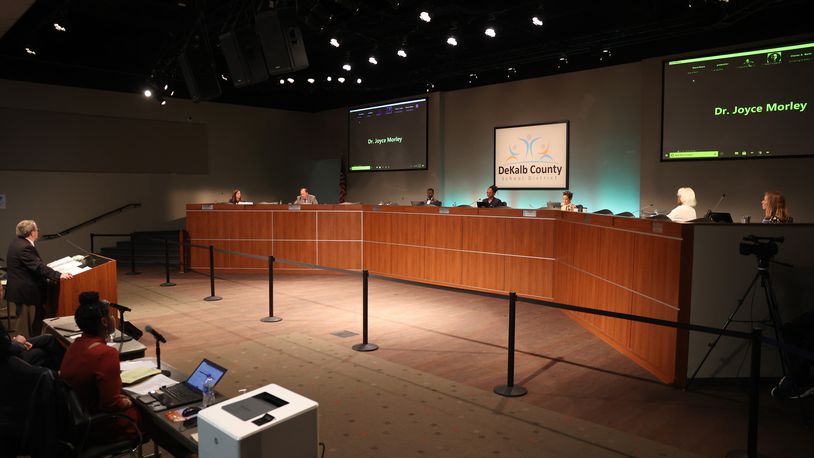
The DeKalb County Board of Education conducts an in-person board meeting in April. On Monday, the board delayed a vote to comply with a new state law that limits how teachers can talk about race and racism in the classroom. (Jason Getz / Jason.Getz@ajc.com)
By Cassidy Alexander
The DeKalb Board of Education decided to indefinitely postpone a vote on implementing a new state-required policy related to the teaching of “divisive concepts.”
Several board members said they agree with what critics of the new divisive concepts law have maintained all along: That it’s unnecessary, and could hinder teachers’ ability to teach children about history.
The vote to postpone was unanimous on Monday, despite board members not knowing what the consequences could be for not complying with the new law.
The move was unusual for metro Atlanta, where several school boards spent the summer approving policies to comply with the Aug. 1 deadline set in the law.
Georgia lawmakers this year approved legislation that limits how teachers can talk about race and racism in the classroom. It bars teachers from asserting that the United States is fundamentally racist, that one race is superior to another or that individuals should feel guilty because of their race.
It also requires school districts to create a process to review complaints from parents and others who allege those concepts are being mishandled. Complaints start with principals and could make it all the way to the state school board.
But when presented with the policy Monday, DeKalb board member Joyce Morley said she refuses to be part of an effort to limit students’ understanding of history and discrimination.
“There’s no way in the world I can support something like this,” she said, speaking to her own experiences with racism as a Black woman. “To have such a policy put into effect and we all go along with it and no one says anything? This is why nothing changes.”
Board member Marshall Orson said he agreed with Morley.
“I feel comfortable thinking that amongst all of us as colleagues, we probably share the view about what this law is doing,” he said. “Which is really denying our obligation to make sure our children learn from and are fully familiar and raised in the history so they can learn and grow from that, and so our society can.”
Board attorney Clem Doyle said Monday that the statute does not list any consequences for boards that don’t pass a policy and he wasn’t aware of the Legislature weighing in on the issue, but other districts have also objected. The Clarke County School District in Athens unanimously rejected the state-mandated complaint policy last month, Flagpole Magazine reported.
In postponing the vote, the DeKalb board did not reject the policy. It also did not set a date for revisiting the discussion.
Although she was in favor of postponing the vote, board member Deirdre Pierce raised a question about the consequences of not complying with the deadline set in the law.
The Georgia Department of Education stepped in several months ago and issued a corrective action plan for the district to fix poor conditions at Druid Hills High School. The decision to fire Cheryl Watson-Harris from her role as superintendent in April drew the ire of some state officials, including Gov. Brian Kemp. And the state recently designated the district as “moderate risk” after a financial audit found problems with how it manages money.
“We’re already under a microscope enough,” Pierce said, referencing recent entanglements with state leaders.
Read the original story on AJC.com.











